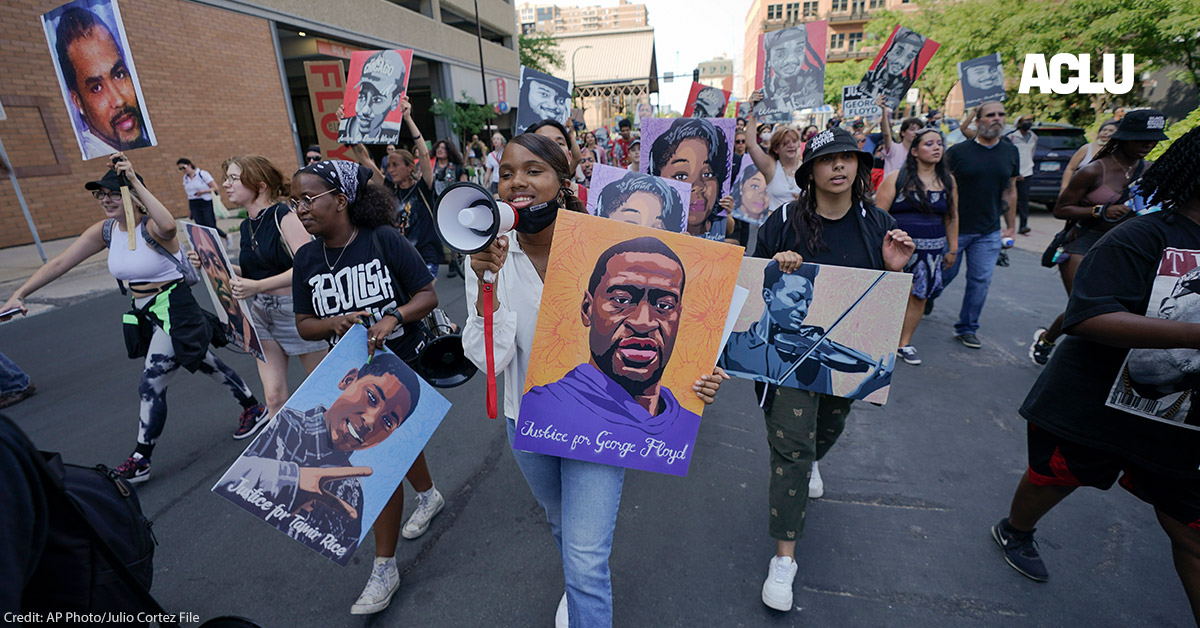
ACLU v. DOJ – FOIA Lawsuit Seeking Records About the Use of JTTFs and Fusion Centers to Target Protesters and Communities of Color
What's at Stake
Joint Terrorism Task Forces (JTTFs) and fusion centers are joint federal-state law enforcement intelligence hubs with a long history of investigating, collecting, and disseminating information on protesters and communities of color, but the public has little information about how these entities work and their impact on our rights. In May 2024, the ACLU filed a request under the Freedom of Information Act seeking the release of records on the use of JTTFs and fusion centers to target protesters and communities of color and the adequacy of the privacy, civil rights, and civil liberties policies that apply to them. When the government failed to release records, we filed suit in July 2024 to compel public disclosure of these documents.
Stay informed about our latest work in the courts.
By completing this form, I agree to receive occasional emails per the terms of the ACLU's privacy statement.
Summary
JTTFs are FBI-operated partnerships between federal, state, and local law enforcement and intelligence agencies that conduct terrorism investigations. Fusion centers are a network of 80 state-run entities developed and supported by the Department of Homeland Security (DHS) as intelligence hubs to collect and disseminate counterterrorism and other information. They receive funding, guidance, training, personnel, and other support from DHS.
JTTFs and fusion centers have a history of wrongly targeting and monitoring activists and communities of color and associating protest with “terrorism”—without any evidence of wrongdoing. For example, after 9/11, the FBI used JTTFs to conduct widespread “voluntary” interviews in Muslim communities. More recently, in 2020, then-Attorney General Barr deployed JTTFs in response to racial justice protests against the police killings of George Floyd and other Black people. Around the country, fusion centers have similarly targeted and disseminated intelligence reports on protestors and protest activity, as well as individuals based on their beliefs, religion, race, or ethnicity—again without any connection to actual wrongdoing.
Both JTTFs and fusion centers are secretive and subject to scant accountability. JTTFs have not been subject to meaningful oversight, which is especially troubling since they are structured to deputize state and local law enforcement participants as federal agents, and can thereby shield them from local and state laws protecting civil rights and civil liberties. Indeed, police forces in a few of the nation’s largest cities have chosen to leave FBI task forces because of disputes with federal officials over transparency and accountability for abuses. The only investigation of fusion centers, conducted in 2012 by the U.S. Senate Permanent Subcommittee on Investigations, concluded that fusion center intelligence was “oftentimes shoddy,” “sometimes endangering citizens’ civil liberties and Privacy Act protections,” and was “more often than not unrelated to terrorism.”
In 2023, after years of advocacy by the ACLU and other civil rights groups, DOJ adopted new nondiscrimination guidance that covers JTTFs and other federal task forces working in cooperation with state and local law enforcement. Despite certain improvements, the DOJ guidance contains national and homeland security loopholes that permit biased profiling. DHS has adopted DOJ’s guidance pending a new DHS policy, but it is unclear how it applies to fusion centers. The public needs to know if and how the 2023 guidance has been applied to and by JTTFs and fusion centers, and whether it is effective at protecting rights and preventing discrimination.
This FOIA lawsuit seeks public disclosure of information on JTTFs’ and fusion centers’ monitoring and collection of information on protestors, the degree to which they associate protest with terrorism, and the adequacy of their privacy, civil rights, and civil liberties policies in safeguarding against abuses and discrimination. This information is critical for the public to understand how federal, state, and local agencies collaborate in monitoring people engaged in dissent and the resulting impact on our rights.
Legal Documents
Press Releases
ACLU Urges Court to Order Government to Release Records on Fusion Center and Joint Terrorism Task Force Surveillance
ACLU Sues Federal Agencies for Information on Intelligence Hubs Used to Surveil Protestors and Communities of Color